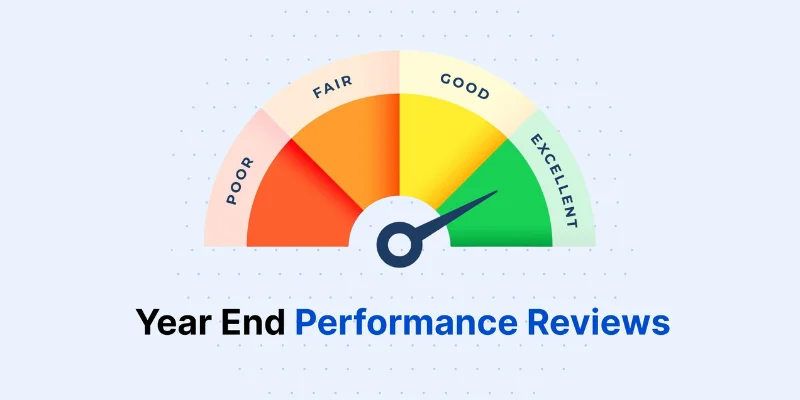What Is an Employee Annual Review? Meaning, Process & Examples
An employee annual review is a year-end evaluation of an employee’s yearly performance, which generally takes place once a year. Thus, it is also called an annual performance review or end-of-year review.
During this review, managers talk about the employee’s achievements and areas for improvement. It’s a chance to offer constructive feedback to the team members and also discuss future goals and opportunities. At the same time, employees can share their own experiences and thoughts with their managers.
Overall, the annual employee evaluation process helps companies assess how well employees are doing in their roles. More importantly, it highlights areas for improvement so employees can better support the company’s goals, along with the year-end appraisal objectives. It focuses on the employee’s professional development, ensuring their growth is in sync with organizational success.
Frequently Asked Questions
Q1. | What is an Employee Annual Review in HR? |
| Ans. | Employee annual review meaning in HR refers to the period at the end of the calendar or fiscal year. During this time, HR teams wrap up crucial processes such as annual performance appraisals, payroll reconciliation, tax documentation, benefits updates, and strategic planning for the upcoming year. |
Q2. | Why is Employee Annual Review important? |
| Ans. | An employee annual review is important as it offers clear benefits to both organizations and employees. When done well, it can boost motivation and strengthen commitment. This type of feedback also helps improve manager-employee relationships. Moreover, the annual appraisal process open the door to growth, feedback, and goal setting. Other benefits of conducting an employee annual evaluation are that it clarifies expectations, makes time for conversation, and improves work performance. |
Q3. | How can HR make Employee Annual Reviews more effective? |
| Ans. | To make employee annual reviews more effective, HR should start by giving clear and helpful feedback. They should ask employees for their input and ideas. One of the most valuable review meeting tips is to connect individual goals with the organization’s broader mission, ensuring alignment and purpose. HR teams should also encourage ongoing feedback all year long, not just at the end. This means setting clear performance expectations from the beginning, using data to support what’s being said, and working together with employees to set future goals. |
Q4. | How should employees prepare for their Employee Annual Review? |
| Ans. | Employees can prepare for their annual review process by taking the following steps: Reflect on their accomplishments – Review the goals set at the beginning of the year and list the important achievements. Gather evidence – Collect data, feedback, or examples that support your performance and contributions. Be honest about challenges – Note down the areas where you struggled and be ready to discuss how you handled them or plan to improve. Set new goals – Think about what you want to achieve in the next year and how your role can grow. Prepare questions – Bring up any concerns or ideas about your career path, workload, or development opportunities. Stay professional – Approach the review with a positive attitude and a willingness to learn and improve. |
Q5. | What should managers avoid during Employee Annual Reviews? |
| Ans. | During employee performance review process, managers should avoid being unprepared, focusing only on recent performance, or giving vague feedback. They should not only highlight negatives but also consistently recognize positive contributions. It’s important to avoid overemphasizing criticism, unnecessarily linking salary discussions to the review, or neglecting employee development goals. Moreover, managers should encourage open dialogue, provide specific examples, and ensure that the review is a two-way conversation. And lastly, always end the review with clear, goal-focused planning for the future. |
Q6. | Are Employee Annual Reviews necessary if regular feedback is already provided? |
| Ans. | Yes, year-end reviews or annual performance evaluations are still necessary even if regular feedback is provided. Ongoing feedback, like a 360 degree performance appraisal, helps employees stay on track. Year-end reviews provide a structured opportunity to reflect on performance, set long-term goals, and align achievements with organizational objectives. They also provide a formal setting for discussing career development, performance trends, and addressing any larger concerns that may not come up in regular check-ins. Additionally, HR performance reviews help ensure that employees and managers are on the same page regarding expectations and future growth plans. |
Q7. | Can you share examples of employee annual review feedback? |
| Ans. | Yes, here are some commonly used performance review examples during employee annual reviews. Positive feedback: “You consistently meet deadlines and maintain excellent attention to detail.” Constructive feedback: “Improving time management would help you better handle multiple tasks.” Self-Performance Review: “I’m confident in presenting my ideas clearly and engagingly, but I’m looking to improve by fostering more interactive discussions during meetings.” Goal-setting: “Next year, aim to take the lead on at least one major project.” |
Resources
Explore how HR trends 2026 are shaping workplaces and employee experiences.
Get to know the complexities of salary structures and key terms.
See how year-end reviews improve performance and organizational growth.





